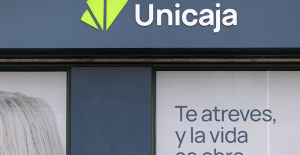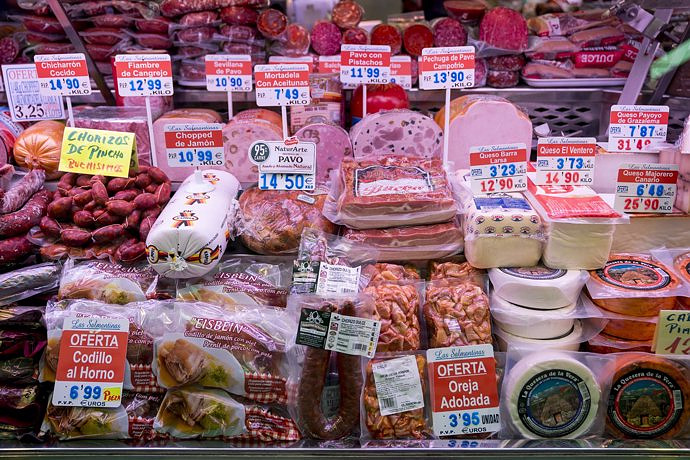MADRID, 26 Ene. (EUROPA PRESS) -
The Ibex 35 closed the week with a rebound of 0.79%, reaching 9,936.6 points, thus ending a two-week downward streak after the European Central Bank (ECB) decided yesterday , for the third consecutive meeting, leave interest rates at 4.5%, while already looking ahead to next week's meeting by the United States Federal Reserve (Fed).
The Spanish selective has thus remained on the verge of the symbolic level of 10,000 points, a level that it lost at the beginning of last week and that it only touched briefly at the opening last Tuesday. However, with three sessions left to close the first month of the year, the Ibex registered a provisional depreciation of 1.64% in January.
The main indicator of the Spanish market has passed throughout the week as if it were a pendulum, alternating on a daily basis and without clear direction the positive closing with the negative one, although finally enough recovery has been imposed to cut the bearish streak. of the last two weeks.
The latest negotiations have been marked, according to XTB director, Joaquín Robles, by the ECB and its president, Christine Lagarde, who "tried to cool expectations about rate cuts and said that the decision will be conditioned by upcoming data." .
The highest authority of the 'guardian of the euro' pointed out yesterday at a press conference that it is "premature" to discuss rate cuts, although last week, at the Davos forum, he pointed to a possible start of cuts for next summer. The market consensus is in favor of placing the cuts throughout the spring.
Throughout the week the market has also received an important battery of macroeconomic data: the PMI composite index, prepared by S
For its part, the same indicator, but referring to the activity of the United States in January, has widened its difference in expansive territory thanks to the improvement of the services sector and, especially the improvement of the manufacturing sector, which has gone from a contraction zone to expansive.
Precisely, in the United States it was announced in the final moments of the week that the gross domestic product (GDP) registered an expansion of 0.8% in the fourth quarter of the year, moderating four tenths with respect to the growth of 1.2%. of the third quarter. In annualized figures, US GDP growth between October and December reached 3.3%, compared to 4.9% in the previous three months, far exceeding market consensus expectations of 2%.
Likewise, the United States personal consumption expenditure (PCE) price index, the statistic chosen by the Federal Reserve (Fed) to monitor inflation, stood at 2.6% year-on-year in the month of December, the same figure. to that of November, while the underlying index, which excludes food and energy prices from its calculation due to their greater volatility, closed the last month of 2023 with an increase of 2.9%, three tenths less than the month previous.
In other geographies, the People's Bank of China (PBPC) decided to lower the cash reserve ratio required of the country's entities by 50 basis points with the objective of "consolidating and improving the positive trend of economic recovery." For its part, the Bank of Japan (BoJ) has maintained its official interest rates at -0.1% and has cut its inflation projections.
When translating this data into the stock markets, Robles pointed out that "the North American indices reached new historical highs due to the change in focus of investors, who now see economic strength as a reason for the recovery of business profits." , while in the Old Continent "the worse economic data is causing worse performance."
Regarding Spain, the publication of the 2023 Active Population Survey (EPA) stood out, a period in which unemployment fell by 193,400 people, which is 6.4% less than in 2022, while employment grew by 783,000 jobs (3.8%), ending the year with more than 21 million employed people and less than 3 million unemployed.
Given this situation, in the weekly calculation of the Ibex, the advances of Grifols (14.24%), IAG (7.88%), Cellnex (5.81%), Acciona (5.45%) and ArcelorMittal ( 5.09%). On the other hand, the worst weekly performance has been led by Solaria (-6.02%), Iberdrola (-2.23%), Banco Santander (-1.68%), Enagás (-1.48%) and Bankinter ( -1.29%).
Despite Grifols' recovery this week, its price is still 30% below the levels prior to the outbreak of the crisis due to the report by the bearish firm Gotham City Research, which accused the company of making up your accounts.
Regarding Bankinter, which has inaugurated the national results season, Robles has argued that despite improving its profit by 14%, it has not managed to exceed analysts' expectations. "We see these results as a warning sign for the banking sector," he added.
On the other hand, the National Securities Market Commission (CNMV) decided this Friday to lift the suspension of Ezentis with effect from 8:30 a.m. on Monday, January 29, after more than a year of paralysis.
In the rest of the European places the increases have been imposed during the week: Milan has added 0.32%; Frankfurt 2.45%; London 2.74% and Paris 3.56%. For their part, Wall Street indices advanced around 1% in the week.
At closing time in Europe, the price of a barrel of Brent quality oil, a reference for the Old Continent, rose almost 4% in the week, to 81.5 dollars, while Texas stood at 76.3 dollars, 4.15% more.
Robles attributes this rise in the price of 'black gold' to the reduction of inventories in the United States, tensions in the Red Sea and rumors about greater stimuli in China.
In the foreign exchange market, the price of the euro against the dollar fell 0.3% in the week, to 1.0864 'greenbacks', while in the debt market the interest required on the 10-year Spanish bond It closed at 3.195% after subtracting five basis points in the week, with the risk premium (the differential with the German bond) at 89.9 points.
Next week will be full of great economic references, according to Robles, and among the most notable data are the GDP of Spain and Germany for the last quarter of 2023, the CPI of the eurozone for the month of January and employment data in the United States. ; On the part of the central banks, on Wednesday there will be a rate decision in the US and on Thursday in the United Kingdom.
Regarding the business results season, Robles has pointed to the publication of accounts of several mega-cap companies, such as Microsoft, Alphabet, Apple or Amazon; For its part, in Spain Naturgy Energy and the rest of the banks, BBVA, Santander, Unicaja, Sabadell and CaixaBank will publish.

 Exploring Cardano: Inner Workings and Advantages of this Cryptocurrency
Exploring Cardano: Inner Workings and Advantages of this Cryptocurrency Seville.- Economy.- Innova.- STSA inaugurates its new painting and sealing hangar in San Pablo, for 18 million
Seville.- Economy.- Innova.- STSA inaugurates its new painting and sealing hangar in San Pablo, for 18 million Innova.- More than 300 volunteers join the Andalucía Compromiso Digital network in one month to facilitate access to ICT
Innova.- More than 300 volunteers join the Andalucía Compromiso Digital network in one month to facilitate access to ICT Innova.-AMP.- Ayesa acquires 51% of Sadiel, which will create new technological engineering products and expand markets
Innova.-AMP.- Ayesa acquires 51% of Sadiel, which will create new technological engineering products and expand markets The CNMV once again suspends Applus's listing
The CNMV once again suspends Applus's listing Línea Directa earns 10.1 million euros in the first quarter, compared to losses of 5.3 million
Línea Directa earns 10.1 million euros in the first quarter, compared to losses of 5.3 million Unicaja triples its profit in the first quarter, up to 111 million euros
Unicaja triples its profit in the first quarter, up to 111 million euros BBVA earns 2,200 million in the first quarter, 19.1% more
BBVA earns 2,200 million in the first quarter, 19.1% more How Blockchain in being used to shape the future
How Blockchain in being used to shape the future Not just BTC and ETH: Here Are Some More Interesting Coins Worth Focusing on
Not just BTC and ETH: Here Are Some More Interesting Coins Worth Focusing on UPV students build a prototype of a wooden house to move to Equatorial Guinea
UPV students build a prototype of a wooden house to move to Equatorial Guinea The UA opens the call for the Impulso 2024 Awards for the best innovative business initiatives
The UA opens the call for the Impulso 2024 Awards for the best innovative business initiatives ALI, virtual assistant from Alicante, internationally recognized by the OECD
ALI, virtual assistant from Alicante, internationally recognized by the OECD Retrópolis brings the golden age of video games and computing to the UPV
Retrópolis brings the golden age of video games and computing to the UPV A million people demonstrate in France against Macron's pension reform
A million people demonstrate in France against Macron's pension reform Russia launches several missiles against "critical infrastructure" in the city of Zaporizhia
Russia launches several missiles against "critical infrastructure" in the city of Zaporizhia A "procession" remembers the dead of the Calabria shipwreck as bodies continue to wash up on the shore
A "procession" remembers the dead of the Calabria shipwreck as bodies continue to wash up on the shore Prison sentences handed down for three prominent Hong Kong pro-democracy activists
Prison sentences handed down for three prominent Hong Kong pro-democracy activists ETH continues to leave trading platforms, Ethereum balance on exchanges lowest in 3 years
ETH continues to leave trading platforms, Ethereum balance on exchanges lowest in 3 years Investors invest $450 million in Consensys, Ethereum incubator now valued at $7 billion
Investors invest $450 million in Consensys, Ethereum incubator now valued at $7 billion Alchemy Integrates Ethereum L2 Product Starknet to Enhance Web3 Scalability at a Price 100x Lower Than L1 Fees
Alchemy Integrates Ethereum L2 Product Starknet to Enhance Web3 Scalability at a Price 100x Lower Than L1 Fees Mining Report: Bitcoin's Electricity Consumption Declines by 25% in Q1 2022
Mining Report: Bitcoin's Electricity Consumption Declines by 25% in Q1 2022 Oil-to-Bitcoin Mining Firm Crusoe Energy Systems Raised $505 Million
Oil-to-Bitcoin Mining Firm Crusoe Energy Systems Raised $505 Million Microbt reveals the latest Bitcoin mining rigs -- Machines produce up to 126 TH/s with custom 5nm chip design
Microbt reveals the latest Bitcoin mining rigs -- Machines produce up to 126 TH/s with custom 5nm chip design Bitcoin's Mining Difficulty Hits a Lifetime High, With More Than 90% of BTC Supply Issued
Bitcoin's Mining Difficulty Hits a Lifetime High, With More Than 90% of BTC Supply Issued The Biggest Movers are Near, EOS, and RUNE during Friday's Selloff
The Biggest Movers are Near, EOS, and RUNE during Friday's Selloff Global Markets Spooked by a Hawkish Fed and Covid, Stocks and Crypto Gain After Musk Buys Twitter
Global Markets Spooked by a Hawkish Fed and Covid, Stocks and Crypto Gain After Musk Buys Twitter Bitso to offset carbon emissions from the Trading Platform's ERC20, ETH, and BTC Transactions
Bitso to offset carbon emissions from the Trading Platform's ERC20, ETH, and BTC Transactions Draftkings Announces 2022 College Hoops NFT Selection for March Madness
Draftkings Announces 2022 College Hoops NFT Selection for March Madness























